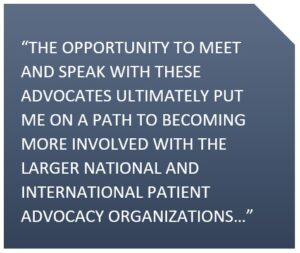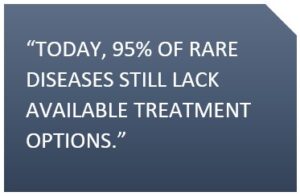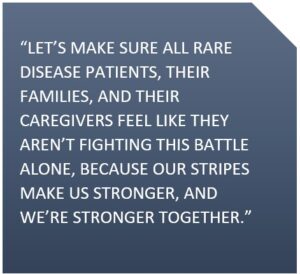
Contributed by Connor Galloway, Sr Director, Business Development & Strategy
If you know me, then you know that shining a big spotlight on the plight of rare disease patients and families is a particularly strong passion of mine. When I was in high school, my childhood friend Andy lost a lifelong battle with Duchenne muscular dystrophy, a rare degenerative muscular disease that no one I knew had ever heard of before he was diagnosed. Several years later, close family friends lost their 5-year-old son to Tay-Sachs disease, a rare and fatal genetic neuromuscular disease that no one in my very large, very Irish American family had ever heard of before, even though as many as 1 in 50 Irish Americans could be a carrier.
Getting Involved

When I had the opportunity early in my career to focus exclusively on educating healthcare providers about orphan-designated drugs in clinical development for rare diseases—almost always starting with awareness of the diseases themselves—I absolutely jumped at the chance. Thanks to a chance meeting with Chris Garabedian, the former visionary CEO of Sarepta Therapeutics, I found myself working in the Duchenne muscular dystrophy space, which meant so, so much to me personally. Through that work, I was able to learn from advocates like Christine McSherry of the Jett Foundation. The opportunities to meet and speak with these advocates ultimately put me on a path to becoming more involved with the larger national and international patient advocacy organizations, including The National Organization for Rare Disorders (NORD), The European Organisation for Rare Diseases (EURORDIS), The EveryLife Foundation for Rare Diseases, and Global Genes. These and so many other amazing organizations support the 350 million people worldwide (more than AIDS and cancer combined) who suffer from more than 7000 rare diseases.

Education and Awareness
During my time as chair of the Healthcare Provider Education Committee at Global Genes—the organization itself made up of more than 500 rare disease patient groups and foundations—I consistently heard from patients, advocates, and caregivers that while their specific diseases might be vastly different, their challenges were not. Families were seeing handfuls of physicians, often at great personal expense, and were waiting years for an accurate diagnosis. Half of rare diseases had no advocacy group to turn to for assistance or information. Today, 95% of rare diseases still lack available treatment options. Despite the tireless efforts of many, the need for awareness among healthcare providers, researchers, legislators, and the general public is just as crucial now as it was 10 years ago, when Rare Disease Day was first observed by organizations in the US.
Rare Disease Day
Rare Disease Day falls on the last day of February each year and on leap day every fourth year, the “rarest” day on our calendar. In this age of social media, the message and global celebration for Rare Disease Day has only grown stronger.

This year’s rally cry, “Show Your Stripes”, highlights the rare disease community’s continued ties to the zebra. Rather than feeling ostracized for their differences , NORD and other groups are encouraging all of us to share and celebrate our uniqueness. Everyone has their own stripes, and while our differences can make us feel like outliers – the fact that we all have those differences is a quality we all share. This year on Rare Disease Day, our team at JB Ashtin encourages you to show your stripes at the office, in your community, and on your social media networks. Anything from posting a photo on social media to writing a letter to your local congressman can help in furthering momentum for this very needed cause. Help us, our orphan drug clients, and our rare disease advocacy partners continue to raise the bar for awareness about this day and what it stands for. Let’s make sure all rare disease patients, their families, and their caregivers feel like they aren’t fighting their battles alone, because our stripes make us stronger, and we’re stronger together.
To find Rare Disease Day events in your area, check out: https://www.rarediseaseday.org/events/world
